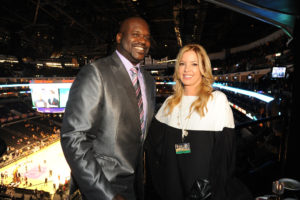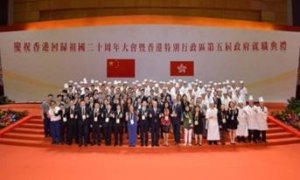Russ Simons Receives Distinguished Leadership Award At National Sports Safety And Security Conference
By Alison Crumpton
Russ Simons, Chief Listening Officer/Managing Partner at Venue Solutions Group, was presented with the Distinguished Leadership Award during the 2017 National Sports Safety and Security Conference & Exhibition on July 11-13 in Orlando, Fla. The event is presented annually by the National Center for Spectator Sports Safety and Security (NCS4) at The University of Southern Mississippi.
The Distinguished Leadership Award recognizes a professional in the field whose career includes multiple achievements and  contributions with respect to sport safety and security. To warrant this prestigious honor, the recipient’s service, commitment, ingenuity and integrity must have elevated the profession to new levels.
contributions with respect to sport safety and security. To warrant this prestigious honor, the recipient’s service, commitment, ingenuity and integrity must have elevated the profession to new levels.
“To be included in the same conversation as the past winners of the NCS4 Distinguished Leadership Award is very humbling to me,” said Simons. “I also feel that I now have additional responsibility to continue my personal and professional commitment to elevating security performance in our industry.
“We live in a time where we cannot afford to become complacent in any way. I enthusiastically join the past winners of this award in a combined effort to keep our facility staff, participants, performers and guests safe.”
For more than 36 years, Simons has been involved in nearly every facet of the sports and entertainment facility industry including design, construction and management. At Venue Solutions Group (VSG), Simons directs the firm’s safety,
security, risk and crowd management operations. He works with operators at every level from colleges and universities to every major professional sports league. Additionally, Simons works on industry safety and security issues, having recently lead webinars on Ebola and protests, civil disobedience and demonstrations.
“Russ is a tireless worker who exemplifies professionalism and passion. His commitment to the profession is evident in career accomplishments that we have all benefited from,” said NCS4 Director Lou Marciani. “He has forged a major change in how we manage venue operations, engineering, safety/security, guest services, and administration.”
Simons is the current chair of the Department of Homeland Security Public Assembly Facility Sub-Sector Council. He serves on the IAVM Safety and Security Committee, and leads a Cyber Security Working group for the organization.
Simons is a 2004 recipient of the GIGI Award of Excellence in event marketing and PR and member of the Arena & Event Marketing Hall of Fame. He is an architect of the Walmart “Black Friday” crowd management plan, including the development and training of more than 1.6 million Walmart associates in more than 4,000 Walmart stores in the United States. His plan is now standard operating practice for all Walmart “Retailtainment” events.
Prior to creating Venue Solutions Group, Simons was a senior principal with the global design firm Populous. There he managed the firms’ facility operations, evaluation and analysis group which assisted public assembly venues in the renovation and development of new facilities. He works closely with a wide variety of facility designers, architects and operators as they create functional and secure sports and entertainment facilities.
Simons is the former SVP and COO of Bridgestone Arena in Nashville, home to the NHL Nashville Predators. He has provided services to more than 86 colleges and universities.
Alison Crumpton is Director of Communications and Logistics for the National Center for Spectator Sports Safety and Security (NCS4).
UpStart: Emerging Leaders Experience

IAVM’s Foundation has once again partnered with Western Kentucky University to bring UpStart: Emerging Leaders Experience to VenueConnect in Nashville, TN August 7-9. The program is in its third year and will afford Young Professional and student attendees the opportunity to network and connect with experienced industry professionals throughout the three day conference.
“On behalf of the Board of Trustees, we are extremely pleased to be offering the third year of UpStart: Emerging Leaders Experience,” stated Bob Hunter, IAVM Foundation, Chair. “This program’s success is due in large part to Western Kentucky University, our founding partner and sponsor. We are grateful for their investment in these young professionals through their continued support of the program”
UpStart was designed by IAVM’s Foundation, IAVM and WKU as a means to provide professional development to future leaders of venue management by providing young professionals the chance to build relationships with current industry leaders, engage in transformative learning opportunities, and interact with other students and young professionals in a conference setting.
“WKU is honored to play an instrumental role in the program,” said Dr. Evie Oregon, Assistant Professor and Coordinator of the Master of Science in Intercollegiate Athletic Administration with the School of Kinesiology, Recreation, & Sport at Western Kentucky University (WKU). “We believe this program is a great opportunity for up and coming young professionals to learn and network. This program also gives a chance for well-seasoned professionals to give back and help the future leaders. I had the honor to be a part of the first two UpStart programs, and I believe this year will be the best yet.”
This year’s UpStart will be three days of content:
UpStart: Game Changer
Monday, August 7 | 8:00 AM – 10:00 AM | Room 201
Breakfast will be served before everyone’s favorite Game Changer session starts. Game Changer brings together Students and Young Professionals with Industry Leaders for fast paced (think speed networking) Q&A. Every 15 minutes you change to another table to ask more questions all the while learning from some of the industry’s best! Industry leaders who are participating this year are Jason Rittenberry, CFE President & CEO Kentucky Venues, Kim Stone, GM American Airlines Center, Michael Marion, CFE GM Verizon Arena, Bob Hunter, CFE Chief Project Development Officer, Maple Leaf Sports & Entertainment, Air Canada Centre, Adina Erwin, CFE VP and COO Fox Theatre Atlanta, Kelly Shea Senior Booking Director FELD Entertainment and many more!
UpStart: Keynote Speaker
Tuesday, August 8 | 3:30 PM – 4:15 PM | Room 206
Come and learn about how to get into the industry and how to be one of the best in the industry from one of the best Paul Turner, CFE, CSSP, Senior Director of Event Operations AT&T Stadium. Paul will have the attendees learning and excited from the moment he starts with an interactive session. Taking away tips on how to be a leader and succeed in our industry attendees are sure to come out of the room armed with what it takes!
UpStart: Panel Discussion
Wednesday, August 9 | 2:00 PM – 2:45 PM | Room 206
A panel discussion will be led by past and current 30 | UNDER | 30 and Young Professional Industry leaders – Mac Campbell, CVP Deputy Director Baltimore Convention Center, Max Long, Event Coordinator Virginia Beach Convention Center, Ashley Keen, CVP Technical Director/Production Manager Mesa Arts Center and Annie Wilson Assistant Production Supervisor Portland’5 Center for the Arts. Come ready to ask questions during the 45 min session to those who were in your shoes not too long ago!
Speaker Spotlight: Jeanie Buss Will Participate in Panel Discussion at IAVM’s VenueConnect
IAVM’s Women in Leadership program is pleased to welcome Jeanie Buss, CEO and Governor for the Los Angeles Lakers, as part of a panel of industry leaders to address attendees at VenueConnect on Tuesday, August 8th, in Nashville, TN. The session, which is sponsored by ABM, will be moderated by Kim Stone, Executive Vice President and General Manager for American Airlines Arena in Miami, and cover important topics and trends facing today’s venue management industry.
Entering her fifth season as Chief Executive Officer after 15 seasons as Executive Vice President of Business Operations, Buss is responsible for running all aspects of the Los Angeles Lakers organization. Buss, who not only leads all Laker business operations, which include managing team marketing and sponsorships as well as relationships with broadcast partners, also oversees the team’s basketball operations, working closely with President of Basketball Operations Earvin “Magic” Johnson and General Manager Rob Pelinka.

LOS ANGELES, CA – APRIL 2: at Staples Center on April 2, 2013 in Los Angeles, California. Copyright 2013 NBAE (Photo by Andrew D. Bernstein/NBAE via Getty Images)
In addition to her role as CEO, Buss also serves as the Lakers’ Governor, representing the team on the NBA’s Board of Governors. She is currently a member of the NBA Advisory and Finance Committee and has served on the NBA Labor Committee during collective bargaining with the NBA Players Association.
Buss, who spent four years serving as President of the Great Western Forum before joining the Lakers, began her career at the age of 19 as general manager of World Team Tennis’ Los Angeles Strings. While guiding the team to two league titles, she also created the Forum Tennis Challenge Series, which became a regular part of the Great Western Forum calendar for years. Buss was responsible for bringing in players such as John McEnroe, Pete Sampras, Andre Agassi, Jimmy Connors, Steffi Graff, Chris Evert, Martina Navratilova and many other top professionals.
Named by the Sports Business Journal in October of 2011 as one of the Game Changers-Women in Sports Business, Buss serves as a board member on the Southern California Committee for the Olympic Games working to bring the Olympics back to Los Angeles. She also is a co-host of Lakers All Access, a yearly event presented by the LA Sports and Entertainment Commission, a nonprofit organization, which draws events and attractions to Los Angeles.
Actively involved in the community, Buss lists Canine Companions for Independence, The Amanda Foundation and the Best Buddies organization among her many charitable endeavors, while also working internally with the Lakers Youth Foundation to raise money for Southern California Youth charities.
HKCEC Welcomed PRC President In Celebration Of Hong Kong’s Return To The Motherland
After nine months of preparation, the team at Hong Kong Convention and Exhibition Centre (Management) Limited (HML) took pride in the successful conclusion of the celebrations of the 20th anniversary of Hong Kong’s Return to the Motherland, and the Inauguration of the Fifth Term Government of the Hong Kong Special Administrative Region, attended by President Xi Jinping of the People’s Republic of China.
HML is proud to have served the historic 1997 handover ceremony when Hong Kong returned to Chinese sovereignty. With proven track  record serving world-class events since then, the 950-member HML team again embraced challenges associated with extensive logistics and hospitality requirements.
record serving world-class events since then, the 950-member HML team again embraced challenges associated with extensive logistics and hospitality requirements.
Together with an additional 1,500 temporary supporting staff, HML provided professional support to the Hong Kong Government, including the Police, to ensure efficient, safe and comfortable setting for the Grand Variety Show, Flag Raising and Inaugural Ceremonies, fireworks display dinners and many related meetings during the three days on and before July 1, 2017.
Manchester Arena “Working Extremely Hard” To Open By September 16
Manchester Arena says it is “working extremely hard” to ensure it can reopen on time following the terrorist attack that claimed more than 20 lives in May.
SMG Europe, which operates the venue, is hopeful of work being completed in time for a John Legend concert on September 16. All  events have been cancelled at the 21,000-capacity venue since the attack at an Ariana Grande concert in which a suicide bomber killed 22 adults and children and injured more than 250.
events have been cancelled at the 21,000-capacity venue since the attack at an Ariana Grande concert in which a suicide bomber killed 22 adults and children and injured more than 250.
With the nail bomb used by terrorist Salman Abedi also causing major damage to the venue’s foyer, the operator has confirmed that repair work is now under way.
In an update, Manchester Arena officials said: “The renovation work has now started in the main public area outside the arena and we are working extremely hard to ensure our re-opening in early September.
“We will continue to keep you informed as much as possible on our official re-opening date and up and coming show information. We still have some great events to announce for 2017 and of course 2018. You can find all show information on our Event Calendar page.
“We also want to express our thanks to all those who have contacted us with their kind wishes and support. Our ongoing thoughts and prayers still remain with all those affected by the atrocity that happened.”
Concerts by Take That, Kings of Leon and Radiohead are among those to have been cancelled in the last two months. Artists including Metallica, Phil Collins and Little Mix are due to play Manchester Arena before the end of 2017.
Do you want to receive a Front Row News weekly digest?
Categories
- Allied (861)
- Architecture (147)
- Arenas (747)
- Career (897)
- Convention Centers (895)
- Education (623)
- Events (1,544)
- Food & Beverage (193)
- Foundation (113)
- Guest Experience (1,496)
- Industry News (2,270)
- Leadership (1,888)
- Marketing (150)
- Membership (2,000)
- Music (213)
- Performing Arts Centers (454)
- Professional Development (409)
- Research (127)
- Safety & Security (442)
- Sports (763)
- Stadiums (608)
- Student (159)
- Technology (516)
- Ticketing (92)
- Touring (82)
- Trends (364)
- Uncategorized (749)
- Universities (218)
- Video (25)
- Young Professional (198)
Twitter Feed
- Twitter feed loading
Categories
- Allied
- Architecture
- Arenas
- Career
- Convention Centers
- Education
- Events
- Food & Beverage
- Foundation
- Guest Experience
- Industry News
- Leadership
- Marketing
- Membership
- Music
- Performing Arts Centers
- Professional Development
- Research
- Safety & Security
- Sports
- Stadiums
- Student
- Technology
- Ticketing
- Touring
- Trends
- Uncategorized
- Universities
- Video
- Young Professional
Archives
- January 2026
- December 2025
- November 2025
- October 2025
- September 2025
- August 2025
- July 2025
- June 2025
- May 2025
- April 2025
- March 2025
- February 2025
- January 2025
- December 2024
- November 2024
- October 2024
- September 2024
- August 2024
- July 2024
- June 2024
- May 2024
- April 2024
- March 2024
- February 2024
- January 2024
- December 2023
- November 2023
- October 2023
- September 2023
- August 2023
- July 2023
- June 2023
- May 2023
- April 2023
- March 2023
- February 2023
- January 2023
- December 2022
- November 2022
- October 2022
- September 2022
- August 2022
- July 2022
- June 2022
- May 2022
- April 2022
- March 2022
- February 2022
- January 2022
- December 2021
- November 2021
- October 2021
- September 2021
- August 2021
- July 2021
- June 2021
- May 2021
- April 2021
- March 2021
- February 2021
- January 2021
- December 2020
- November 2020
- October 2020
- September 2020
- August 2020
- July 2020
- June 2020
- May 2020
- April 2020
- March 2020
- February 2020
- January 2020
- December 2019
- November 2019
- October 2019
- September 2019
- August 2019
- July 2019
- June 2019
- May 2019
- April 2019
- March 2019
- February 2019
- January 2019
- December 2018
- November 2018
- October 2018
- September 2018
- August 2018
- July 2018
- June 2018
- May 2018
- April 2018
- March 2018
- February 2018
- January 2018
- December 2017
- November 2017
- October 2017
- September 2017
- August 2017
- July 2017
- June 2017
- May 2017
- April 2017
- March 2017
- February 2017
- January 2017
- December 2016
- November 2016
- October 2016
- September 2016
- August 2016
- July 2016
- June 2016
- May 2016
- April 2016
- March 2016
- February 2016
- January 2016
- December 2015
- November 2015
- October 2015
- September 2015
- August 2015
- July 2015
- June 2015
- May 2015
- April 2015
- March 2015
- February 2015
- January 2015
- December 2014
- November 2014
- October 2014
- September 2014
- August 2014
- July 2014
- June 2014
- May 2014
- April 2014
- March 2014
- February 2014
- January 2014
- December 2013
- November 2013
- October 2013
- September 2013
- August 2013
- July 2013
- June 2013
- May 2013
- April 2013
- March 2013
- February 2013
- January 2013
- May 2012
- March 2012
- December 2011
- November 2011
- October 2011
Recent Comments
- Frank Bradshaw, Ph.D., CVE on John Meyer, CVE, a Tireless Advocate of Certification for Venue Professionals, Has Died
- Neil Sulkes on Hilary Hartung, Friend to Many in Venue Marketing, Has Left Us
- Jason Parker, CVE on The Devastation of Hurricane Helene and How We Can Support One Another
- Larry Perkins on Touhey Testifies Against Speculative Ticketing Before Congressional Subcommittee
- Peter Secord on Major Players for Planned Elkhart Amphitheater Were in the Mix at VenueConnect
